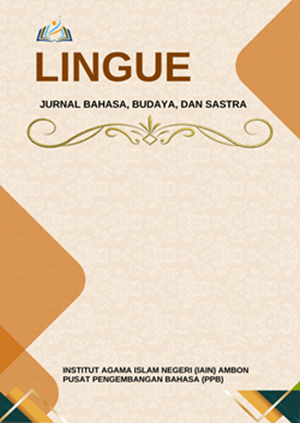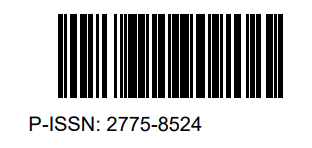DYSPHEMISTIC LANGUAGE AND SOCIAL COGNITION: AN ANALYSIS IN ONLINE COMMENTS ON 2024 PRESIDENTIAL ELECTION COVERAGE
DOI:
https://doi.org/10.33477/lingue.v7i1.9240Keywords:
critical discourse analysis, dysphemistic language behaviour, social cognitionsAbstract
This study examines language practices occurring in the comment sections of online media, specifically in the comment sections of news articles related to the 2024 Indonesian presidential election. The researcher found that there were instances of dysphemistic language behavior in the majority of comments in the election news comment sections. Using the critical discourse analysis method, the researcher analyzed both the textual and contextual aspects of comments that met the criteria for dysphemistic language practices. The research findings revealed dysphemistic practices carried out by commenters, directed both at the subjects being reported on and at other commenters participating in the discussion. Furthermore, the researcher also identified two social cognitions that underlie the production of dysphemistic comments. These two social cognitions are: (1) Rejecting Prabowo as a proxy for Jokowi; and (2) Presidential and vice-presidential candidates must not have negative sides. The practical contribution of this research is to provide an understanding of the impact of dysphemistic language practices in the comment sections of 2024 presidential election news on readers' social cognition, which can assist in designing more effective communication policies or strategies for managing healthy and constructive online interactions.
References
Azka, I., & Syahputra, I. (2023). Komunikasi Politik Capres Anies Baswedan Menuju Pemilu 2024 Melalui Media Sosial Instagram. J-IKA: Jurnal Ilmu Komunikasi Fakultas Ilmu Komunikasi Universitas BSI Bandung, 10(1), 37–45 https://doi.org/10.31294/kom.v10i1.15231
Cahyono, A., Iftitah, A., Hidayatullah, A. R., Yuliastuti, E., & Susetiyo, W. (2023). Analisis Kritis terhadap Penerapan Presidential Threshold dalam Pemilihan Umum 2024: Perspektif Hukum Normatif di Indonesia. Jurnal Supremasi, 1–14 https://doi.org/10.35457/supremasi.v13i2.3041
Chaer, A. (2004). Makna dan Semantik. International Journal of Artificial Organs, 27(5), 424–432. https://repository.ut.ac.id/4770/1/PBIN4215-M1.pdf
Dhona, H. R. (2019). Analisis wacana Foucault dalam studi komunikasi. Journal Communication Spectrum: Capturing New Perspectives in Communication, 9(2), 189–208. http://dx.doi.org/10.36782/jcs.v9i1.2026
Erlinawati, D. (2016). Penggunaan Disfemia dalam Komentar Para Netizen di Situs Online Kompas. Com pada Rubrik “Politik.” Jurnal Bahasa dan Sastra Indonesia, 5(2). https://journal.student.uny.ac.id/index.php/bsi/article/viewFile/1539/2667.
Evanalia, S. (2022). Peran Jurnalisme Media Sosial dalam Mewujudkan Demokrasi Indonesia di Era Post Truth. Jurnal Adhyasta Pemilu, 5(1), 32–43. https://doi.org/10.55108/jap.v5i1.86
Firdaus Muhammad. (2023). Konfigurasi Politik dan Problem Identitas Menjelang Pemilihan Presiden 2024. Vox Populi, 6(2), 79–86. https://doi.org/10.24252/vp.v6i2.41757.
Firmansyah, A., Ristiyani, R., & Roysa, M. (2023). Bentuk disfemisme pada komentar akun instagram mata najwa melalui kajian teori wijana & rohmadi. Edukasiana Jurnal Inovasi Pendidikan, 2(1), 15-25. https://doi.org/10.56916/ejip.v2i1.204
Febriansyah, F., & Muksin, N. N. (2020). Fenomena Media Sosial: Antara Hoax, Destruksi Demokrasi, dan Ancaman Disintegrasi Bangsa. Sebatik. https://jurnal.wicida.ac.id/index.php/sebatik/article/view/1091
Hamdanny, D. R., & Mukhtar, K. (2021). Wacana Poros Partai Islam untuk PILPRES 2024: Politik Identitas atau Penggalangan Suara Oposisi. Politea, 4(2), 190. 10.21043/politea.v4i2.11735.
Hamdi, S., Maulana, I., & Rahmawadi, I. (2024). Drama, Manuver dan Cawe-Cawe Politik Menjelang Pilpres 2024. GOVERNANCE: Jurnal Ilmiah Kajian Politik Lokal Dan Pembangunan, 10(4). https://doi.org/10.56015/gjikplp.v10i4.221.
Haris, A., Amalia, A., & Hanafi, K. (2022). Citra Politik Anies Baswedan Di Media Massa. Communiverse: Jurnal Ilmu Komunikasi, 7(2), 15–24. https://doi.org/10.36341/cmv.v7i2.2631.
Hasanah, M. U., Widiastuti, W., & Makhrian, A. (2024). Konstruksi Berita Pencalonan Prabowo Subianto dan Gibran Rakabuming Raka sebagai Capres dan Cawapres 2024: Analisis Framing Pada Media Kompas. com dan CNN Indonesia (Edisi 16-25 Oktober 2023). Jurnal Indonesia: Manajemen Informatika Dan Komunikasi, 5(1), 988–999. https://doi.org/10.35870/jimik.v5i1.586.
Jannah, R. (2024). Representasi Disfemisme Dalam Ceramah Maulid Di Aceh. https://rama.unimal.ac.id/id/eprint/2245/.
Juditha, C. (2014). Penilaian Masyarakat Sulawesi Selatan Terhadap Kredibilitas Komunikator Politik Calon Presiden dan Wakil Presiden Republik Indonesia 2014. Jurnal Pekommas, 17(3), 139–150. https://doi.org/10.30818/jpkm.2014.1170302.
Khaeriyah, K., & Dewi, M. S. (2023). Disfemia dalam Kolom Komentar Akun Instagram Abouttng_Official Kasus Pembuangan Bayi di Wilayah Banten. Lingua Rima: Jurnal Pendidikan Bahasa dan Sastra Indonesia, 12(2), 271– 279. http://dx.doi.org/10.31000/lgrm.v12i2.9192.
Majid, N. (2023). Strategi Komunikasi Politik dalam Pemilihan Umum Di Era Digital. PERSEPTIF: Jurnal Ilmu Sosial Dan Humaniora, 1(2), 53–61. https://pdfs.semanticscholar.org/5bce/78c556e949d783132325a5e430f3fc551fd1. Pdf.
Muhammad, F. (2023). Konfigurasi Politik dan Problem Identitas Menjelang Pemilihan Presiden 2024. Vox Populi, 6(2), 79–86 https://doi.org/10.24252/vp.v6i2.41757.
Nikmah, S. W. (2024). Pelanggaran Etika Pemilu oleh Penyelenggara Pemilu dan Implikasinya terhadap Legitimasi Status Gibran Rakabuming-Raka sebagai Wakil Presiden pada Pemilu Tahun 2024. MADANIA Jurnal Hukum Pidana Dan Ketatanegaraan Islam, 14(2), 23–38. https://journals.fasya.uinib.org/index.php/madania/article/view/655.
Nuraliza, V., Rahmadi, A. N., Mubaroq, A., Kristiyono, K., Melani, A. P., & Ifana, A. (2024). Peran komunikasi politik dalam membentuk opini publik menghadapi Pemilu 2024. CENDEKIA: Jurnal Ilmu Sosial, Bahasa dan Pendidikan, 4(1), 245–261.https://doi.org/10.55606/cendikia.v4i1.2514.
Nuraeni, I., Harisanti, N., & Maksum, H. (2022). Tuturan kebencian dalam komentar warganet pada akun instagram @obrolanpolitik: kajian pragmatik. Ranah Jurnal Kajian Bahasa, 11(1), 189. https://doi.org/10.26499/rnh.v11i1.4198.
Palangka, U., & Tengah, R. K. (n.d.). Komunikasi efektif dalam dunia pendidikan. Jurnal.Unmer.Ac.IdY WismanJurnal Nomosleca, 2017•jurnal.Unmer.Ac.Id
Rifqi, F. M. (2025). Analisis Kontroversi Calon Wakil Presiden Gibranrakabuming Raka Di Pemilihan Presiden 2024. Jurnal Ilmu Sains Dan Teknologi, 1(1), 5–11. https://artmediapub.id/index.php/JIST/article/view/67.
Rizekuna, R. and Siregar, M. (2024). Pengaruh berbicara kasar dalam konteks sosial terhadap perkembangan akhlak anak usia prasekolah. Khazanah, 43-52. https://doi.org/10.51178/khazanah.v3i2.2037
Silaswati, D. (2018). Analisis wacana kritis dalam pengkajian wacana. Ejournal.Unibba.Ac.Id. https://ejournal.unibba.ac.id/.
Sonny, S. (2019). Peta Politik Identitas Di Indonesia: Studi Terpilihnya Kh Ma’ruf Amin Sebagai Bakal Cawapres Bakal Capres Inkumben Joko Widodo Pada Pilpres 2019. Jurnal Renaissance, 4(01), 443–455. https://www.neliti.com/publications/483117/peta-politik-identitas-di-indonesia-studi-terpilihnya-kh-maruf-amin-sebagai-baka.
Supriyadi, Ady. (2024). Urgensi Hak Angket Dewan Perwakilan Rakyat Republik
Indonesia Guna Menyelidiki Dugaan Kecurangan Pemilu. Journal.Unmasmataram., 18 (1). http://journal.unmasmataram.ac.id/index.php/GARA/article/view/785.
Tambunan, E. M., Sembiring, R. E. B., Gozali, F., & Sianturi, D. M. R. (2024). Analisis Eksistensi Etika Hakim Mahkamah Konstitusi Dalam Mewujudkan Peradilan Berintegritas Dan Akuntabel (Putusan Mk No. 90/Puu-Xxi/2023). Iblam Law Review, 4(2), 50–61. https://doi.org/10.52249/ilr.v4i2.406.
Van Dijk, T. A. (1994). Discourse and cognition in society. Communication theory today, 107–126.
Van Dijk, T. A. (2002). Media contents: The interdisciplinary study of news as discourse. Dalam A handbook of qualitative methodologies for mass communication research (hlm. 108–120).
Van Dijk, T. A. (2015). Critical discourse analysis. The handbook of discourse analysis. https://doi.org/10.1002/9781118584194.ch22.
Widodo, R. B., & Almansur, A. T. (2023). B Strategi Kampanye Politik Capres– Cawapres Anies Baswedan–Muhaimin Iskandar: Di Pemilihan Presiden 2024. Jurnal Da’wah: Risalah Merintis, Da’wah Melanjutkan, 6(2), 129–159. https://doi.org/10.38214/jurnaldawahstidnatsir.v6i2.211.
Wisman, Y. (2017). Komunikasi efektif dalam dunia pendidikan. Jurnal Nomosleca,
Downloads
Published
How to Cite
Issue
Section
License
If accepted for publication, the copyright of the article belongs to the author. Copyright includes the exclusive right to reproduce or transmit manuscripts in any form and media: reprint, produce photographs, microfilm, or translated versions of the manuscript. Increasing parts of this journal, storage and transmission of databases of any form or media, such as electronic copies, electrostatic and mechanical copies, photocopies, recordings, magnetic media and so on are permitted without permission. LINGUE: Jurnal Bahasa, Budaya dan Sastra, allow readers to read, download, copy, distribute, print, search, or link the fulltext of its articles and allow readers to use them for any other lawful purpose. However, it can not be used for commercial purposes
Jika diterima untuk publikasi, hak cipta artikel adalah milik penulis. Hak Cipta mencakup hak eksklusif untuk mereproduksi atau mengirimkan manuskrip dalam bentuk dan media apa pun: mencetak ulang, menghasilkan foto, mikrofilm, atau versi terjemahan dari manuskrip tersebut. Memperbanyak bagian jurnal ini, penyimpanan dan transmisi database dalam bentuk atau media apa pun, seperti salinan elektronik, salinan elektrostatis dan mekanis, fotokopi, rekaman, media magnetis, dan sebagainya diizinkan tanpa izin. LINGUE: Jurnal Bahasa,Budaya dan Sastra, memungkinkan pembaca untuk membaca, mengunduh, menyalin, mendistribusikan, mencetak, mencari, atau menautkan teks lengkap artikelnya dan memungkinkan pembaca untuk menggunakannya untuk tujuan yang sah lainnya. Namun, tidak dapat digunakan untuk tujuan komersial

LINGUE : Jurnal Bahasa, Budaya, dan Sastra Ciptaan disebarluaskan di bawah Lisensi Creative Commons Atribusi-TanpaTurunan 4.0 Internasional.







